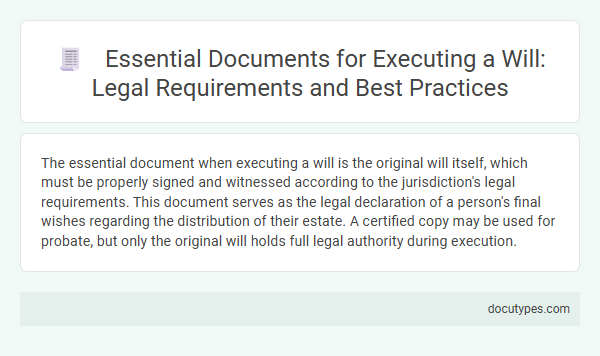The essential document when executing a will is the original will itself, which must be properly signed and witnessed according to the jurisdiction's legal requirements. This document serves as the legal declaration of a person's final wishes regarding the distribution of their estate. A certified copy may be used for probate, but only the original will holds full legal authority during execution.
Introduction to Essential Will Documents
Executing a will requires certain essential documents to ensure its legality and proper validation. These documents serve as proof of the testator's intentions and identity.
The primary document is the will itself, which outlines the distribution of assets and final wishes. A valid will must be signed by the testator and witnessed by impartial individuals according to jurisdictional laws. Supporting documents such as identification and affidavits may also be necessary to verify the testator's capacity and authenticity.
Legal Requirements for a Valid Will
Executing a will requires meeting specific legal criteria to ensure its validity and enforceability. The essential document in this process is the signed and witnessed will, which outlines the testator's final wishes.
- Signed Will - The will must be signed by the testator to demonstrate intent and authenticity.
- Witness Acknowledgment - Most jurisdictions require the will to be witnessed by at least two disinterested parties to validate the document.
- Testator Capacity - The person executing the will must be of legal age and sound mind to make the document legally binding.
Proper execution following these legal requirements ensures that the will is accepted by courts during probate.
Types of Wills: Choosing the Right Format
Choosing the right format of a will is crucial to ensure its legal validity and the clear distribution of assets. Different types of wills cater to diverse personal circumstances and estate planning needs.
- Attested Will - This traditional will is signed by the testator and witnessed by two or more individuals to confirm authenticity.
- Holographic Will - A will entirely handwritten and signed by the testator, often valid without witnesses in some jurisdictions.
- Oral Will (Nuncupative Will) - A spoken will declared in front of witnesses, typically used in emergencies and accepted only under specific legal conditions.
Key Elements Every Will Should Include
When executing a will, the essential document is the signed and witnessed will itself, which legally expresses the testator's final wishes. Key elements every will should include are the identification of the testator, clear designation of beneficiaries, and detailed instructions for asset distribution. Including a revocation clause for previous wills and naming an executor ensures the will's validity and proper administration of the estate.
Role of Witnesses and Notarization
What document is essential when executing a will? The primary document required is the properly signed will itself, which must clearly express the testator's final wishes. Witnesses play a crucial role by attesting to the testator's signature and mental capacity, ensuring the will's validity.
Why is notarization important when executing a will? Notarization provides an additional layer of authentication, confirming the identities of the signatories and the voluntary nature of the testator's actions. This formal acknowledgment helps prevent future disputes and simplifies probate proceedings.
Appointing Executors: Duties and Documentation
The essential document when executing a will is the "Last Will and Testament," which outlines the distribution of assets and appoints executors. Executors are responsible for managing the estate, ensuring debts are paid, and distributing assets according to the will. Your appointment of executors must be clearly documented in the will to grant them legal authority to fulfill these duties.
Supplementary Documents: Letters of Instruction and Guardianship
When executing a will, supplementary documents play a crucial role in clarifying the testator's intentions and providing additional guidance. Letters of instruction and guardianship papers are essential components that complement the primary will document.
- Letters of Instruction - These documents offer detailed, non-legal guidance to executors and beneficiaries about handling personal matters and specific wishes not included in the will.
- Guardianship Documents - These legal papers appoint guardians for minor children, ensuring their care and welfare according to the testator's preferences.
- Supplementary Documentation Importance - Together, these documents provide clarity and prevent potential disputes, supporting the smooth execution of the estate plan.
Safekeeping and Accessibility of Will Documents
The essential document when executing a will is the original signed will itself. This document must be carefully safeguarded to ensure its authenticity and legal validity during probate.
Proper accessibility to the will is crucial for the executor and beneficiaries to carry out the deceased's wishes without delay. Storing the will in a secure location such as a bank safe deposit box or with a trusted attorney ensures it remains protected and readily available when needed.
Common Mistakes to Avoid in Will Drafting
| Essential Document | Last Will and Testament |
|---|---|
| Purpose | Specifies the distribution of assets after death |
| Common Mistakes to Avoid in Will Drafting |
|
What Document Is Essential When Executing a Will? Infographic

